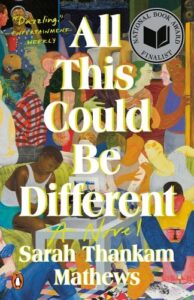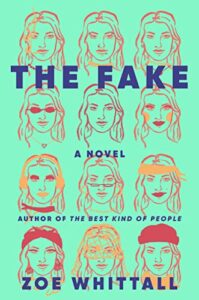Buy this from Bookshop.org to support local bookstores and the Lesbrary!
I have heard only great things about this book since it came out in 2022, but I somehow didn’t actually pick it up until my queer book club chose it for this month’s pick. I vaguely remembered downloading an ARC on my ereader, so I opened that up and jumped in. I was immediately struck by two surprises: 1) I wasn’t really enjoying the book, though I had been expecting to love it, and 2) I had started this book already. I was eight percent of the way through—which is not a lot, but it means at some point I started and abandoned it. Aside from the unease of reading through highlights I couldn’t remember making, I was also beginning to have a sinking feeling that this was not going to live up to the glowing reviews I’d heard.
Sneha is not an easy main character to like in the beginning of the story. She’s freshly graduated from her program and starting a new job in a new city: Milwaukee. She doesn’t have any real connections here, and she struggles to find her footing. Her property manager lives downstairs and erupts in anger if she makes the slightest noise. Her job is demanding and unpredictable. She hooks up with women without looking for anything lasting. And throughout it, she simmers with self-loathing that periodically boils over into cruelty and judgement.
Sneha is a queer woman of colour who has a lot of internalized racism, sexism, and homophobia. She thinks hateful things about other women, people of colour, and queer people. She’s angry and judgmental, but she’s also passive. She feels constrained by being an immigrant, especially because her father was deported. She worries that any misstep will result in failure—not just her own, but also failure to live up to her parents’ dreams.
“What nobody told me when I was a very young person was that obedience, fearful toeing of every line, chasing every kind of safety, would not save you.”
At this point in the story, I was having trouble with it. It was interesting enough to keep going, but I began to think that maybe I’ve grown beyond identifying with 20-something fuckup literary fiction—a genre I loved when I was younger. I might have even DNFed it, if it weren’t for my book club. But then…it got me. Somewhere along the way, I realized I’d gotten invested in Sneha and the network of relationships she formed.
There’s such a payoff in Sneha’s character growth—not that she becomes a perfect person, but that she becomes more accepting of herself and others. And that payoff feels so powerful because she was such a mess in the beginning. So I can’t fault the book for that, and I will say it’s worth sticking with through those beginning chapters, when she is being insensitive and even cruel.
If you’re a fan of messy found family dynamics, I definitely recommend this one. All the characters are complex and flawed, but they come together to support each other. Tig is definitely the standout character of the novel: a charismatic Black nonbinary philosopher who imagines a better world and both accepts Sneha and holds her accountable.
“This is my tragedy and my great good fortune, to be the recipient of this bond, to be kept alive under its crushing warmth and weight, to be given it so freely, so much more than I have ever deserved.”
The small section of the book that takes place in India adds a lot of depth to the story, I think. Even Sneha’s mother is a complex character—maybe more so than Sneha originally gives her credit for.
I was also surprised to see how the story is structured: while most of the book takes place over a small time span, there are a few chapters that go over several years. I think some readers will find that jarring, but I appreciated seeing the bittersweet aftermath of this formative time in these characters’ lives.
I definitely recommend this as a book club book, because there is so much to pull out and discuss, from issues of classism and appropriation to it being set during the recession to Sneha’s character arc to Sneha’s relationship with Marina and a lot more. It’s definitely one I think I would appreciate even more on rereading.


